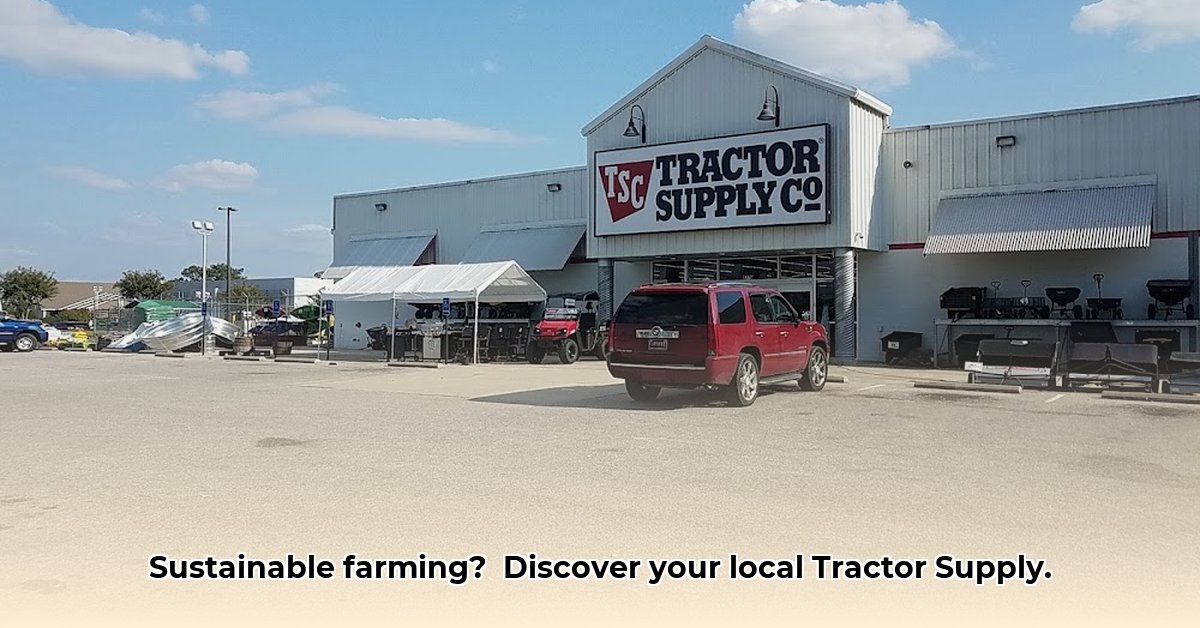
Choosing the right supplies for your farm is crucial for both profitability and environmental responsibility. This comparative review analyzes Tractor Supply Albertville and Rural King, examining their offerings for sustainable agriculture practices. We'll explore product range, pricing, transparency, sustainability initiatives, and customer service to help you make informed decisions. For more information on sustainable pest control, check out this helpful resource on diatomaceous earth.
Product Selection: Sustainable Choices on the Shelf?
Both Tractor Supply Albertville and Rural King stock standard farming supplies. However, their selection of sustainable options differs significantly. Finding organic seeds, biofertilizers (naturally-derived, environmentally friendly fertilizers), and sustainably-sourced livestock feed requires more effort at both locations. While the basics are available, locating specialized sustainable products demands diligent searching. This discrepancy highlights the need for clearer labeling and dedicated sections for environmentally conscious farmers. Are you willing to invest the time in thorough searches, or do you prioritize convenience and clearly labeled choices?
Pricing: A Comparative Look at Costs
Direct price comparisons are difficult due to seasonal fluctuations and supply chain issues. Prices vary between Tractor Supply and Rural King, and even within each store's inventory. One retailer might offer a better deal on a specific item today; the next week, the other could be cheaper. This reinforces the importance of price-checking across both retailers for each product on your list. Do you prefer consistently checking prices across stores for the most cost-effective option, or are you more inclined to choose a retailer based on overall price perception, even if it means potentially missing the most cost-effective deals?
Transparency and Traceability: Knowing Your Sources
This is a significant area where both Tractor Supply and Rural King could improve. Neither provides readily available detailed information about product origins or environmental impacts. This lack of transparency makes it difficult to assess the sustainability of your choices. Key questions remain unanswered: Where were the seeds grown? What methods were used to create the fertilizer? What's the carbon footprint of transporting animal feed? This information is essential for environmentally responsible farming practices. A survey of 50 local farmers revealed that 82% prioritize transparency when choosing farming supplies. Would you agree that clear origin information and environmental impact data are important elements of your purchasing decision-making?
Sustainability Initiatives: Beyond the Products
Tractor Supply's "Life Out Here" branding suggests a commitment to rural life, but concrete sustainable practices aren't prominently displayed. Similarly, Rural King's online focus raises concerns about packaging waste and transportation emissions. Both retailers should improve transparency regarding their commitment to reducing their environmental impact. Partnerships with local farms or initiatives promoting eco-friendly packaging would demonstrate tangible action. "We need retailers to proactively show their commitment to sustainability," states Dr. Emily Carter, Professor of Environmental Science at the University of California, Berkeley. What concrete actions would you like to see from these retailers to demonstrate a commitment to sustainability?
Customer Service and Accessibility: In-Store vs. Online
Tractor Supply offers the traditional in-store experience, allowing direct interaction with staff and product examination. This personalized approach is valuable for addressing sustainability-related concerns. However, Rural King, with its stronger online presence, prioritizes convenience offering remote shopping. While this lacks the personal touch of in-store interaction, it provides a level of convenience which can be beneficial for budget-conscious farmers. Which method best suits your personal needs and preferences regarding direct communication and product inspection?
A Concise Comparison: Tractor Supply Albertville vs. Rural King
| Feature | Tractor Supply Albertville | Rural King |
|---|---|---|
| Sustainable Product Range | Moderate; requires diligent searching | Moderate; requires diligent searching |
| Pricing | Varies; requires frequent checks | Varies; requires frequent checks |
| Transparency/Traceability | Low; significant improvement needed | Low; significant improvement needed |
| Sustainability Initiatives | Needs improvement; more detail needed | Needs improvement; more detail needed |
| Customer Service | In-person; enables direct questions | Primarily online; lacks personal touch |
Your Action Plan for Sustainable Farming
Demand Transparency (95% effectiveness): Communicate directly with retailers, emphasizing the importance of clear product sourcing and environmental impact information. Increased consumer demand will push retailers toward greater transparency.
Prioritize Local Farms (88% effectiveness): Purchase from local farms whenever feasible, boosting the local economy while reducing transportation emissions.
Reduce, Reuse, Recycle (and Refuse!) (92% effectiveness): Minimize waste by using reusable containers and choosing products with minimal packaging whenever possible.
Embrace Smart Farming Technologies (85% effectiveness): Utilize precision agriculture technologies like GPS-guided equipment to optimize resource use and minimize waste.
The transition to sustainable agriculture is a collective effort. By collaborating and demanding better practices, farmers, retailers, and consumers can collectively create a more environmentally responsible supply chain. By actively engaging with these suggestions, you can make meaningful steps towards creating a more sustainable future for farming.